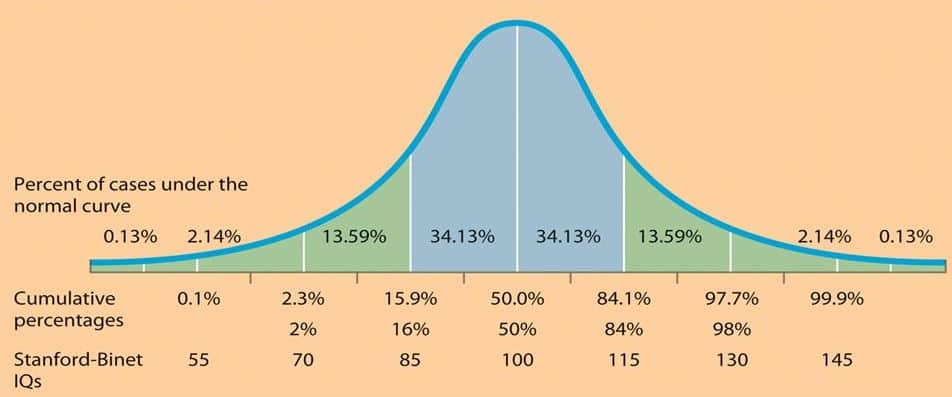The IQ test is perhaps one of the most famous tests in the world. Intelligence quotient (IQ) tests are used to locate one’s intelligence—or potential for intelligence. Learn more about the IQ scale below.
So what is an average IQ score range, and how do you know if you have a genius IQ? There are a number of different intelligence tests, but the first and most well-know was developed in the early 1900s by Alfred Binet, a French psychologist.
Learn more about IQ scores and various IQ ranges. If you want to see what you would score, take our free IQ test with instant results.
IQ Score Range
IQ scores differ depending on which version of the test you take, but the average IQ score ranges are between 85 and 115. Shown below is an IQ chart classifying the range of scores according to the Stanford-Binet test.
| IQ Range | IQ Classification |
|---|---|
| 145 – 160 | Very gifted or highly advanced |
| 130 – 144 | Gifted or very advanced |
| 120 – 129 | Superior |
| 110 – 119 | High average |
| 90 – 109 | Average |
| 80 – 89 | Low average |
| 70 – 79 | Borderline impaired or delayed |
| 55 – 69 | Mildly impaired or delayed |
| 40 – 54 | Moderately impaired or delayed |
As you can see the IQ scale is a very broad range with many different areas in which you could fall. Most people tend to fall in the 85-115 area.
What is the Average IQ?
The average IQ of most people falls on a bell curve, where there is an even distribution of scores on either side of the curve:

You’ll notice that the highest number of people (68%) score somewhere in the blue region of the curve. An average IQ range is between 85 and 115—somewhere between “below average” and “above average” intelligence.
What is a High IQ?
A high IQ is considered to be between 116 and 144. Roughly 16% of the population is capable of achieving this score.
What is Genius IQ?
Although there is no official “genius” classification, one could consider a genius IQ to be 145 and above. Only about 2% of the population has a genius-level IQ. Oftentimes, people with genius IQs are scientists, musicians, and child prodigies.
What are IQ Scores?
What IQ tests actually measure is a subject of much debate. When asked to define intelligence, every educator, scientist, and researcher would give a different answer. But without a clear definition of intelligence, how can it be measured?
Contrary to popular belief, IQ test scores are not a measure of intelligence. They are a measurement of one’s cognitive ability to solve problems. Thus, they do not consider non-cognitive elements such as personality, motivation, conscientiousness or perseverance, all of which can have significant influence on your life and career.
If you are interested in elements like that, consider taking our free personality test.
One’s IQ score range is also not stagnant, and can grow and change over time. An individual’s IQ can change due to their exposure to grade school, high school or college education, various life experiences, and changes in the environment around them.
A child that is tested at age 10 will not likely have the same IQ test score at age 30 or even age 50.
IQ scores are not a perfect measurement tool because IQ tests are man-made, and each one inherenetly contains flaws. The majority of intelligence tests are written multiple-choice tests. How an individual interprets what the question is asking for has a large bearing on how they answer the questions, which in turn affects the resulting IQ test score.
You can read this research paper on IQ tests for more information.
How Are IQ Scores Measured?
There is no one specific way to measure IQ. There are a variety of tests that have been devised to measure IQ both in a group setting and on an individualized basis. All IQ tests consist of measuring an individual’s mental abilities in comparison to others in similar circumstances or age ranges.
However, there are two primary tests of an individual’s intelligence that are considered to be the most widely used tests: the Stanford-Binet and the Wechsler.
Stanford-Binet Test
In the early 1900s, the Stanford-Binet was used to test children’s basic intellectual functions in U.S. schools and in psychiatric clinics to diagnose mental health issues. The U.S. Army even utilized it during World War I to determine the intelligence and abilities of new cadets in order to determine if they were fit to enlist and to place them in the best positions for their mental abilities.
Today, the Stanford-Binet test is still the most widely accepted method of testing intelligence in children and young adults. The test can be administered to anyone aged 2 through 85.
Wechsler Test
The Wechsler Adult Intelligence Scale (WAIS) was developed by David Wechsler in 1955. His theory was that a person’s intelligence is made up of several specific and interrelated elements that can each be isolated and measured. He proposed that the Binet test was oriented more towards children rather than adults because of its emphasis on speed and timed tasks.
The Binet test did not take into account that certain non-intellectual variables could affect the intelligence scores and that intellectual performance could deteriorate as a person aged.
The WAIS is the most commonly used IQ test for teens and adults and is administered to anyone aged 16 through 90.
Interpretation of IQ Scores
Great care must be taken in the interpretation of an individual’s IQ score. Identifying a child as gifted or mentally impaired may help teachers and school systems to provide resources for those students that require them the most and tailor their educational methods to best reach these students.
However, labeling students in any way can also be harmful to their self-esteem.
A child labeled as mentally impaired or learning can be separated out of a regular classroom and placed into a special education classroom where the work is less challenging, which may ultimately discourage them from seeking advanced education or certain types of employment.
Alternatively, a child labeled as gifted can be separated out of the regular classroom and placed into an advanced placement course of study where the work is significantly more advanced, and students may be required to work at an accelerated pace.
Overgeneralizations of correlations between IQ test scores and gender or race have historically been clouded in controversy as many researchers and psychologists have challenged that IQ test are culturally, racially, and linguistically biased.
This issue of bias is difficult to resolve as IQ testing is not conducted in every country so it is often difficult to determine whether an individual scored low on an IQ test because they have a learning disability or mentally impairment, or because they come from a different socio-economic background where they were deprived of proper education, support, and even nutrition.
Misconceptions About IQ Scores
Many people have misconceptions of what IQ scores really mean. IQ scores are not prophecies of what a person’s future will be, or what they will do or achieve during their lifetime.
Consider the IQ range of these well-known individuals:
- Thomas Edison, inventor of the electric light bulb, had an IQ test score of 100.
- Richard Feynman, winner of the 1965 Nobel Prize in physics and quantum electrodynamics had an IQ test score of 124.
- Bob Dylan, famous folk and rock musician had an IQ test score of 106.
- President Ronald Reagan had an IQ test score of 104.
It’s important to remember that IQ test scores are not a determinant of a person’s worth or value. A person with a high IQ is not guaranteed to be wealthy or successful, just as a person with a lower IQ is not guaranteed to be poor or a failure.
- Ted Kaczynski, the Unabomber, had an IQ test score of 167.
- Jeffrey Dahmer, serial killer, had an IQ test score of 144.
- Mariah Carey, famous singer, had an IQ test score of 95.
- Tito Ortiz, a former UFC champion, had an IQ test score of 90.
- Andy Warhol, famous pop artist, had an IQ Test score of 86.
- Muhammad Ali, word famous boxing champion, had an IQ test score of 78.
IQ test scores are not a reflection of a person’s:
- Personality
- Happiness
- Creative talent
- Artistic ability
- Musical ability
- Ability to adapt to different environment
- Ability to learn from experience
- Motivation
- Ability to overcome obstacles
Frequently Asked Questions
What is a good IQ score?
A “good” IQ score is subjective. Most people fall between 85 and 115.
Anything above 115 would be considered very good.
How can I increase my IQ level?
There is no one definite way to increase your IQ, but studies show that learning new languages and musical instruments, performing memory activities, frequent reading, and continuing education can be factors in increasing your IQ.
Can IQ increase with age?
Yes. Your IQ score is not static and can change as you get older. Generally, scores go up for older adults between 35 and 44.

